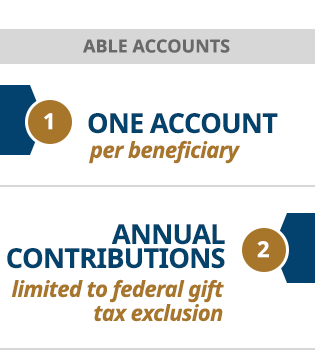
To be eligible, an account owner must be blind or disabled according to Social Security guidelines, and the disability must have occurred before the person reached age 26.
Key Provisions of ABLE Accounts
These key provisions are essential to understanding how ABLE accounts work:
Only one account is allowed per individual. The owner of the account and the beneficiary must be the same individual, who must also be the individual with a disability whose disability expenses are to be paid from the account. If the eligible individual is a minor or does not have the mental capacity to enter into a contract, an authorized individual such as a parent may open the account.
To be eligible, an account owner must be blind or disabled according to Social Security guidelines, and the disability must have occurred before the person reached age 26.
Total annual contributions are limited to the annual federal gift tax exclusion amount, which is $15,000 in 2019. Through 2025, additional annual contributions are allowable up to the lesser of the federal poverty line for a one-person household (currently $12060) and the beneficiary’s compensation for the year. The account maximum value is $511,758 for Pennsylvania accounts. Once this limit is reached, no additional contributions can be made, but interest can still be earned.
Contributions are not tax deductible for purposes of federal income tax, but the account grows tax-free, and withdrawals are tax-free if used for qualified disability expenses. Other withdrawals are subject to regular income tax and a 10 percent surtax. Qualified disability expenses are any expenses related to the individual’s disability, which may include housing, transportation, assistive technology, education and other costs.

Medicaid beneficiaries can save money in an ABLE account without the funds counting as a resource.
It is often a challenge for individuals with disabilities to save money when they rely on public benefits that have strict income and resource limits for eligibility. ABLE accounts address this problem.
Medicaid
Medicaid beneficiaries can save money in an ABLE account without the funds counting as a resource, and SSI eligibility is not affected by account balances of $100,000 or less. In addition, distributions from ABLE accounts do not count as income for SSI or Medicaid.
Upon the death of the beneficiary, states may seek reimbursement from the account for Medicaid benefits paid to the beneficiary. The Commonwealth of Pennsylvania decided in its enabling legislation that it will not, for now, seek such reimbursement, but if the beneficiary received Medicaid benefits in another state, that state may seek reimbursement. Additionally, when the beneficiary dies, the balance of an ABLE account must either be rolled over into the account of a family member or paid to the beneficiary’s estate. Once distributed to the estate, the Commonwealth of Pennsylvania will seek repayment of Medicaid benefits through its estate recovery program, which applies to benefits paid to individuals over the age of 55 for nursing home services, home and community-based services, and related medical services.

Special needs trusts are the preferred option when larger amounts of money are involved. Contributions to ABLE accounts are limited to the annual gift tax exclusion amount.
ABLE accounts and special needs trusts may serve similar needs, but there are important distinctions.
Individuals with disabilities and family members planning for a loved one with special needs should understand the difference between the two, so they can make the best choices. Often the most effective planning will include both an ABLE account and a special needs trust.
ABLE accounts may be a simpler option than special needs trusts, since they are similar to a bank or investment account, but with special rules. Special needs trusts, also called supplemental needs trusts, have different options such as first-party and third-party trusts, with specific rules and requirements. To set up a special needs trust, the services of a special needs planning attorney are highly recommended.
Special needs trusts are the preferred option when larger amounts of money are involved. Contributions to ABLE accounts are limited to the annual gift tax exclusion amount, which is $15,000 in 2019. With ABLE accounts, SSI eligibility is only protected when there is $100,000 or less in the account. Supplemental needs trusts do not have a cap on annual contributions or total funds, and SSI benefits can be protected even if the amount in the account exceeds $100,000. Finally, third party special needs trusts are not subject to Medicaid repayment upon the beneficiary’s death.
More information about special needs planning can be found here.

Although contributions to ABLE accounts are not tax deductible for federal income tax purposes, they may be deducted from Pennsylvania state income tax, up to the gift tax exclusion amount.
ABLE programs are administered by the states, and Pennsylvania was one of the first states to establish its program.
The PA ABLE Savings Program
The Pennsylvania Treasury Department operates the PA ABLE Savings Program, and individuals may open an account by calling 1-855-529-2253 or visiting paable.gov. Some benefits apply specifically to the Pennsylvania ABLE account program.
Tax Benefits
In addition to the federal tax benefits, earnings are also tax deferred with regard to state income tax, and if the earnings are used for qualified expenses, they are tax exempt. Funds held in a PA ABLE account are not subject to the state’s inheritance tax, but assets in the ABLE programs of other states are subject to inheritance tax. Assets held in a PA ABLE account are protected from the claims of creditors in Pennsylvania state proceedings. Funds held in an ABLE account in another state may not be protected in this way.
Although contributions to ABLE accounts are not tax deductible for federal income tax purposes, they may be deducted from Pennsylvania state income tax, up to the gift tax exclusion amount.
The PA ABLE program also provides that when an authorized individual opens an account for a minor, that person continues to have access to the account after the beneficiary turns 18.
